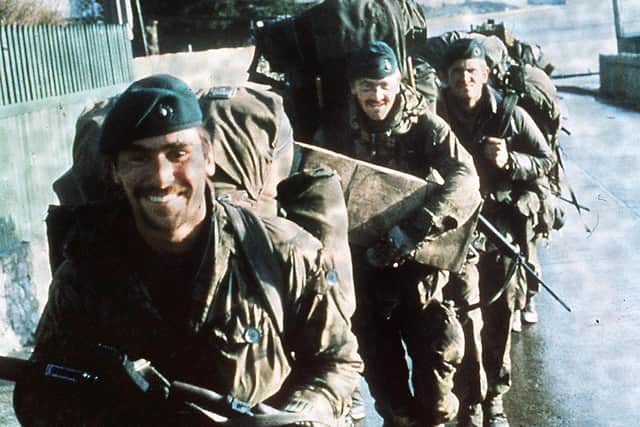Falklands War anniversary: 'No-one ever rings you at 5am with good news' - the Scots marine called to war 40 years ago
It was a Friday and he was supposed to be going off on Easter leave after a demanding three months of winter training in the Cairngorms, Rannoch Moor and Skye. But the voice at the other end of the line had other plans for him.
“Get into the barracks as soon as you can,” he was told. “You’re deploying on operations to the South Atlantic.”
Advertisement
Hide AdAdvertisement
Hide AdHaving sought assurances this was no prank, Gardiner dressed in the dark and rustled around by torchlight in his shed to pack his rucksack. As the dawn light crept in, he mounted his Triumph Bonneville motorcycle and sped off towards Arbroath – the home of 45 Commando.
It was to be the first leg of an 8,000-mile journey to a remote archipelago between Patagonia and South Georgia, and as he learned over the course of the day how Argentina had invaded the Falklands, he was entirely disabused of any lingering suspicions the early morning call might have been a belated April Fools’ joke.
To this day, the 72-year-old remembers those frantic hours in their entirety. “Time hasn’t dimmed the memory of being called to war from your bed,” he says. “No-one ever rings you at the time in the morning with good news.”
For the next two months, Gardiner, then the commander of 45 Commando’s X-Ray Company, helped regain the remote overseas territory in the south-west Atlantic. It was a short yet brutal war. Some 255 British servicemen paid the ultimate price, as did 649 Argentines.
The 45 Commando unit was integral to the war effort, and Gardiner’s rifle company was at the forefront. One of the most significant engagements was the Battle of Two Sisters, a fight for mountain peaks as part of the British advance towards Port Stanley.


The prospect of overwhelming the well dug-in Argentine forces from below was already a daunting enough task, but the fact Gardiner and his men initiated their assault at night, and in the midst of a snowstorm, made it even more treacherous.
Navigating their way in the darkness over ice-covered stone, the company lost one man who fell down a steep bank and was knocked unconscious. Another became wretchedly ill during the night.
When they were finally in position, mortar shells and gunfire rained down on them. Two marines were wounded as they inched their forwards up the hill, and several close-range battles – sometimes at the point of a bayonet – were waged against the enemy.


Advertisement
Hide AdAdvertisement
Hide AdThe hard-won victory gave the British a key strategic advantage, but looking back Gardiner says he and his men were ready, regardless of the abrupt nature of their deployment.
“If you look at it from the outside, with the darkness and snow, the environment looks intolerable, it seems impossible,” he explains. “But when you’re trained to deal with it, it’s not. It was a come-as-you-are party, but we in the Royal Marines were very well prepared for that – it’s what we do. We were an Arctic trained unit ready for mountain warfare. We were good. We were very good.”
Though keen to downplay his own contributions – “I had a ball, and I got a medal for it” – Gardiner stressed the tactics employed by the Royal Marines, and the conditions in which they fought, were not necessarily unusual, even in the 21st century.
“I’m sure some of the people fighting in Ukraine now are doing many of the things we did then,” he reflects. “Modern technology has changed much in the way that war is fought, in particular the range at which you can engage an enemy, but where rubber meets the road, there always remains the need for someone to close them down within sight.”
Gardiner went on to serve a full career in Royal Marines, commanding 40 Commando before retiring in 2001 as a Brigadier. He later became secretary to the military committee at Nato’s headquarters, served as the chief executive of the Scottish SPCA, and wrote ‘The Yompers’, an account of his time in the Falklands.
He has no significant plans this weekend, but as the commemorations continue into the summer, the events will include a national parade and service of remembrance in Edinburgh and June, and a UK-wide service at the National Memorial Arboretum in Staffordshire the same month.
As for Gardiner, he looks forward to meeting up with familiar faces. He remains close to several of those men he fought alongside, and intends to meet with them soon for a special dinner, with plans in place for a 45 Commando reunion in Arbroath.
But for him personally, the 40th anniversary of the Falklands is no different to previous milestones which have come and gone. “Not in the slightest,” he points out. “The memories are as fresh as they were yesterday, and they always have been.”
Advertisement
Hide AdAdvertisement
Hide AdInstead, he urges people to remember those lost, no matter who – or what – they were fighting for.
“We lost people in 45 Commando and our heart breaks for the families,” he says. “It’s a grievous injury which can never, ever mend. No wife, no husband, no mother, no father who has lost someone in war ever sees the pain go.
“Those are the people we should be thinking of, and that goes for the families of those young men on the other side, who were sent to the Falklands by a government simply trying to keep itself in power.”
A message from the editor:
Thank you for reading this article. We're more reliant on your support than ever as the shift in consumer habits brought about by coronavirus impacts our advertisers. If you haven't already please consider supporting our trusted, fact-checked journalism by taking out a digital subscription.
Comments
Want to join the conversation? Please or to comment on this article.
